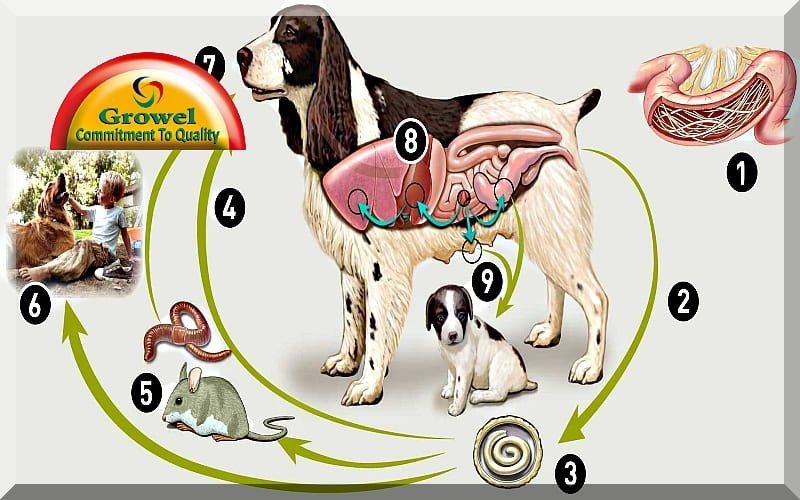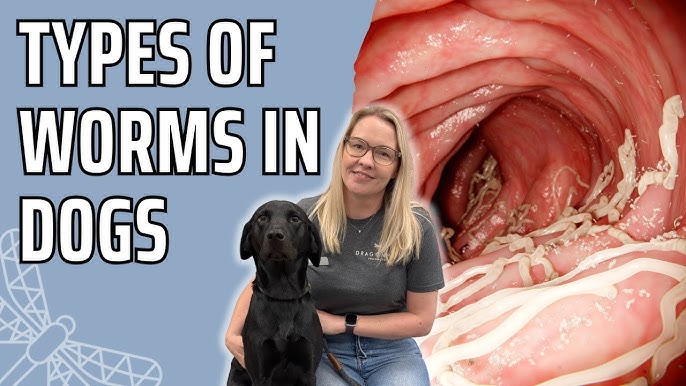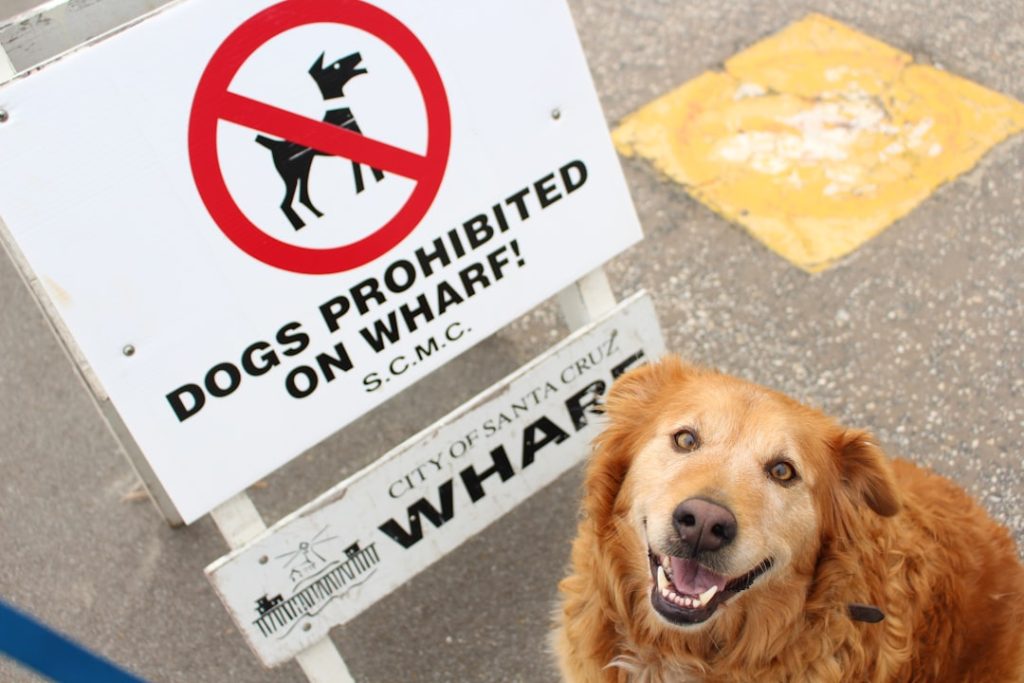You’re a loving pet owner who wants the best for your furry friend. But sometimes, despite your best efforts, your dog might not be feeling their best.
Worms are a common problem that can affect your dog’s health and happiness. Recognizing the signs early is crucial to keeping your pet safe and sound. You’ll discover the telltale signs that your dog might have worms, how they can impact your pet’s well-being, and what steps you can take to ensure your dog stays worm-free.
Don’t let worms catch you off guard—equip yourself with the knowledge to protect your beloved companion. Read on to learn more about how to know if your dog has worms.
Common Types Of Dog Worms
Dogs can get different types of worms. Each worm causes unique problems and symptoms. Knowing the common types helps in early detection and treatment. Here are the main worms that affect dogs.
Roundworms
Roundworms are long, white, and look like spaghetti. Puppies often get roundworms from their mother. They live in the intestines and can cause vomiting and diarrhea. Dogs may look bloated or lose weight. These worms spread through feces or contaminated soil.
Tapeworms
Tapeworms look like small rice grains near the dog’s anus. Fleas usually carry tapeworm larvae, so dogs get them by biting fleas. Tapeworms attach to the intestines and can cause itching and irritation. Dogs may scratch their rear or show small worm segments in their stool.
Hookworms
Hookworms are tiny and hard to see without a microscope. They attach to the dog’s intestines and suck blood. This causes anemia, weakness, and dark, tar-like stools. Puppies are very vulnerable to hookworms. Dogs can get infected by swallowing larvae or through skin contact.
Whipworms
Whipworms have a thin front and thick back, shaped like a whip. They live in the large intestine and cause diarrhea, weight loss, and dehydration. Whipworm eggs are passed in feces and can survive a long time outside. Dogs get infected by swallowing these eggs.
Heartworms
Heartworms live in the heart and lungs, causing serious health issues. Mosquitoes spread heartworms by biting infected dogs. Signs include coughing, tiredness, and difficulty breathing. Heartworms can be fatal without proper treatment and prevention.
Visible Signs On Your Dog
Spotting visible signs that your dog might have worms can make a big difference in getting them treated early. Paying close attention to changes in their behavior and body can help you catch these issues before they become serious. Here are some clear signs you can look for right at home.
Changes In Stool
One of the first signs you might notice is a change in your dog’s stool. Worms can cause diarrhea, which may sometimes contain blood or mucus. You might also see that the stool is softer than usual or more frequent.
Have you ever checked your dog’s poop carefully after a walk? It’s an easy way to spot if something looks unusual.
Visible Worms Or Segments
Sometimes, worms or their segments are visible around your dog’s anus or in their feces. These look like small white grains of rice or thin, string-like pieces. Finding these is a strong sign your dog needs a vet visit immediately.
Don’t ignore these signs, even if your dog seems otherwise fine. Worms can multiply fast and cause serious health problems.
Weight Loss
If your dog is losing weight despite eating normally, worms could be the culprit. They steal nutrients from your dog’s food, leaving your pet hungry but undernourished. Keep an eye on their weight and appetite, as these can change quickly.
Have you noticed your dog’s collar suddenly feeling loose? That could be a red flag worth investigating.
Swollen Abdomen
A swollen or bloated belly is another visible sign of worm infestation, especially in puppies. This swelling happens because worms irritate the intestines and cause inflammation. If your dog’s abdomen looks larger than normal or feels hard, it’s time to get a professional check-up.
Feeling your dog’s belly regularly can help you catch this early. Does your dog let you touch their tummy easily, or do they seem uncomfortable?
Behavioral Changes
Behavioral changes in dogs often signal health issues, including worm infestations. Noticing shifts in your dog’s usual actions can help catch problems early. Pay close attention to energy levels, eating habits, and grooming behavior. These signs can reveal discomfort or illness related to worms.
Lethargy And Weakness
A dog with worms may seem tired and less active than usual. Simple walks might become a struggle. Weakness shows as lack of strength or unwillingness to play. These symptoms occur because worms drain vital nutrients from your dog’s body.
Increased Appetite Or Loss Of Appetite
Worms can affect your dog’s hunger in different ways. Sometimes, the dog feels hungrier because worms steal nutrients. Other times, appetite drops due to stomach discomfort or nausea. Notice any sudden changes in eating patterns.
Excessive Scratching Or Biting
Worm infections can cause itching or irritation around the dog’s rear end. Your dog might scratch or bite that area more than normal. This behavior indicates discomfort caused by worms or related irritation. Check for redness or swelling as well.

Credit: furballstory.com
Health Symptoms To Watch
Recognizing health symptoms in your dog is crucial to catch a worm infestation early. Worms can cause various issues, and some signs might be subtle or easily confused with other problems. Paying close attention to changes in your dog’s behavior and physical condition can help you act before the situation worsens.
Vomiting And Diarrhea
One of the most common signs of worms is frequent vomiting and diarrhea. Your dog might throw up worms or have loose stools that look unusual, sometimes with visible worms or eggs. If your dog’s digestive system is upset for several days, it’s a clear signal to check for worms.
Have you noticed your dog’s appetite changing along with these symptoms? A sudden loss of appetite combined with vomiting or diarrhea can point to a serious worm problem.
Coughing And Respiratory Issues
Worms don’t just affect the gut; some types can migrate to the lungs, causing coughing or breathing difficulties. If your dog starts coughing persistently or seems to struggle to breathe, it might be more than just a cold. This symptom often surprises owners who expect worms to only cause tummy troubles.
Think about your dog’s usual energy levels. Is your pet less active and coughing more? These changes could be related to a worm infection affecting the respiratory system.
Pale Gums And Anemia
Another important symptom is pale gums, which indicate anemia caused by blood-sucking worms. Check your dog’s gums by gently lifting the lip; they should be a healthy pink color. Pale or white gums mean your dog might be losing blood internally, a serious issue linked to worm infestations.
Have you noticed your dog becoming weak or tired more easily? Anemia can drain your dog’s energy, making even simple activities harder. Monitoring gum color is a quick, effective way to spot this hidden sign.
How Worms Affect Different Dog Ages
Worm infections can affect dogs differently depending on their age. Young puppies, adult dogs, and senior dogs show various signs and face unique risks. Understanding these differences helps in timely treatment and care.
Puppies’ Vulnerability
Puppies are highly vulnerable to worms. Their immune systems are still developing. Worms can cause serious problems like diarrhea and weight loss. Severe cases may lead to anemia or even death. Regular vet check-ups and deworming are critical for puppies.
Adult Dogs’ Symptoms
Adult dogs may show milder signs of worm infection. Common symptoms include coughing, vomiting, and a dull coat. Some dogs may have no visible symptoms but still carry worms. Routine fecal tests help detect worms early in adult dogs.
Senior Dogs And Complications
Senior dogs face more complications from worm infections. Their weakened immune systems struggle to fight worms. Worms can worsen existing health issues. Symptoms may include fatigue, weight loss, and digestive upset. Prompt treatment is essential to protect older dogs.
Preventing And Detecting Worms Early
Preventing and detecting worms early helps keep your dog healthy. Worms can cause serious health problems if left untreated. Knowing how to spot signs and take action quickly is key. Regular care and attention reduce risks and improve your dog’s life.
Regular Vet Checkups
Schedule vet visits at least twice a year. Vets check for worms and other health issues. Early detection means easier treatment and fewer complications. Your vet can recommend the best worm prevention plan.
Fecal Testing
Fecal tests identify worm eggs in your dog’s stool. This test helps find worms before symptoms appear. Ask your vet to test regularly, especially for puppies and older dogs. Early detection leads to quick treatment and less risk of spread.
Hygiene And Environmental Control
Keep your dog’s living area clean and dry. Remove feces daily to stop worm eggs from spreading. Wash your dog’s bedding and toys often. Avoid letting your dog eat dirt, feces, or dead animals. Good hygiene lowers the chance of worm infections.
When To Seek Veterinary Help
Knowing when to seek veterinary help for your dog’s worm infection can make all the difference in their recovery. Some signs demand immediate attention, while others require prompt but less urgent care. Understanding these can help you act quickly and keep your furry friend safe.
Emergency Symptoms
Some symptoms mean you should rush your dog to the vet immediately. Look out for:
- Severe vomiting or diarrhea, especially with blood
- Difficulty breathing or coughing persistently
- Extreme weakness, collapse, or seizures
- Bloated or distended abdomen
If your dog shows any of these signs, don’t wait. Quick action can save their life.
Long-term Signs
Other symptoms might not be emergencies but still need veterinary care soon. Watch for:
- Persistent weight loss despite a good appetite
- Visible worms in stool or around the anus
- Frequent scooting or licking of the rear end
- Changes in coat quality, like dullness or hair loss
These signs indicate your dog’s health is compromised and treatment is necessary to prevent serious complications.
Treatment Options
Your vet will choose the best treatment based on the type of worms and severity. Common options include:
- Oral deworming medications to kill the parasites
- Topical treatments for some types of infestations
- Supportive care like fluids and nutrition for weakened dogs
Don’t hesitate to ask your vet questions about the treatment plan. Knowing what to expect helps you provide the best care at home.

Credit: growelagrovet.com

Credit: www.youtube.com
Frequently Asked Questions
How Can I Tell If My Dog Has Worms?
Look for signs like vomiting, diarrhea, weight loss, and a dull coat. Worms often cause a swollen belly and visible worms in stool.
What Are The Common Symptoms Of Dog Worms?
Common symptoms include itching around the anus, lethargy, poor appetite, and coughing. These signs suggest your dog may have intestinal or lung worms.
Can Worms In Dogs Be Detected At Home?
You can notice signs but a vet’s stool test confirms worms. Regular vet visits are essential for accurate diagnosis and treatment.
How Do Dogs Get Worms Initially?
Dogs get worms by ingesting contaminated soil, feces, or through fleas and raw meat. Puppies can also get worms from their mother’s milk.
Conclusion
Dogs with worms need quick care to stay healthy. Watch for signs like stomach pain, weight loss, or changes in stool. Regular vet visits help catch worms early. Clean your dog’s living area often to stop worms from spreading. Treating worms keeps your dog happy and active.
Stay alert and act fast to protect your furry friend. Simple steps make a big difference in your dog’s health. Keep learning about your pet’s needs for a long, joyful life together.

